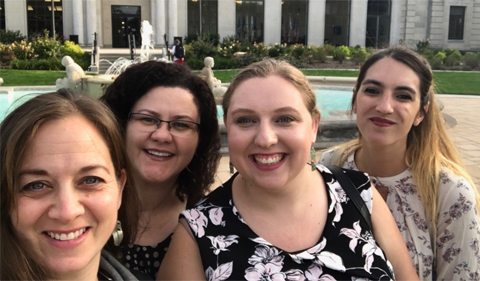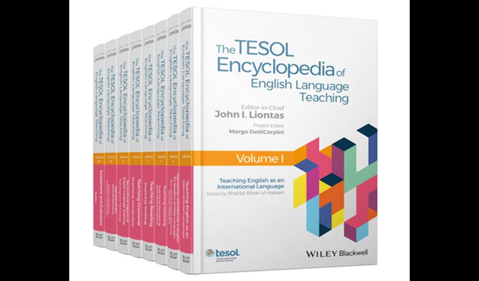Second-year Linguistics M.A. students Sofía Fernandez and Zoe Zawadzki presented their projects at the 10th annual Pronunciation in Second Language Learning and Teaching conference at Iowa State University from Sept. 6-8, along with Dr. Lara Wallace and Dr. Edna Lima of the English Langauge Improvement Program.
Fernandez presented with Wallace, Senior Lecturer in ELIP, with their teaching tip, “Personalizing Peak Vowel Training in Stressed Syllables: A Sneak Peek at Blue Canoe for Perception and Production.”
A teaching tip is a short seven-minute interactive demonstration where teachers present pronunciation-related materials round-robin style. Many tables, each with separate presenters, are set up in a large room and conference attendees (researchers, teachers, students) circulate from one to the next when the bell rings.
Fernandez and Wallace’s presentation concerned the effective pronunciation of key words in spontaneous or planned speech where word stress is a barrier to intelligibility (think comMITtee versus COMedy or cirCUMference versus CIRcumstance). Their tip—designed with international teaching assistants in mind—is a multi-modal process that incorporates a new app, Blue Canoe, to help learners perceive the differences in the stressed syllables, and to practice effectively in order to communicate intelligibly. Blue Canoe is an app that can be used to help learners achieve clearer pronunciation through practice with peak vowels; these peak vowels often are key to dialectal differences that can result in miscomprehension (think adverTISEment versus adVERtisement).
“I enjoyed that I got to meet professors in the field, especially those who specialize in pronunciation. I had the chance to share my interest in Linguistics and share what I want to do in the future,” Fernandez said.
Zawadzki presented with Lima, Lecturer in ELIP, with their teaching tip, “Improving Speaker Comprehensibility: Using Sitcoms and Engaging Activities to Develop Learners’ Perception and Production of Word Stress in English.”
The goal of their presentation was to improve the perception and production of word stress of adult intermediate learners using technology-implemented materials and authentic listening texts. In other words, learners would watch clips from The Big Bang Theory or anything similarly authentic (involving real-world materials and situations) and become aware of and practice word stress features. Their activity could also be modified to target other suprasegmental features such as intonation patterns, prominence, and rhythm. Zawadzki also presented a poster with Lima called “Suprasegmentals + Sitcoms = Becoming More Comprehensible While Having Fun!” This tied into their teaching tip and contained more information about how sitcoms could be used as authentic materials for language learning and teaching.
Both presentations by Zawadzki and Lima were related to a fully online pronunciation course that Lima has been expanding and revising. The project started as Lima’s dissertation project at Iowa State. Zawadzki has been working on the project with Lima for the past 16 months.
Lima says that she “feels very happy to have the opportunity to work with and mentor Zawadzki and to present their work together at the conference. It is also rewarding to see that Zoe plans to pursue a Ph.D. in the same field of study (Applied Linguistics and Technology) after working on this project.”
“I really enjoyed the opportunity of being able to attend this conference,” added Zawadzki. “It was great getting to meet so many people from the field of pronunciation. I even got to see presentations by people whose names I constantly hear regarding pronunciation and I have read so much by them! It was also really awesome getting to share our presentations with people and seeing how interested they were in our topics.”
Wallace added that she very much enjoys the experience of presenting with graduate students. She views it as a form of mentorship and is happy when there are students who are interested in pronunciation.
“Although speaking intelligibly is an essential skill for so many English language learners—especially international teaching assistants, pronunciation as a field is still not as popular or as heavily researched in linguistics and language teaching. For this reason, working closely with graduate students like Sofia allows me to introduce them to the scholars in the field, both through the literature when we write up the proceedings and in person,” Wallace said.
PSLLT features the latest in research and teaching techniques in the field of pronunciation. The information and techniques that OHIO attendees gained from the conference is then applied in the ELIP oral communication classes, and in the ELIP Pronunciation and Presentation Lab.




















Comments